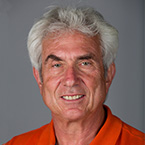
A distinguished cancer researcher, Dr. Karin is well known for defining the mechanisms by which environmental stress, hormones, obesity, and inflammation, as well as immune cells including B lymphocytes, macrophages, and regulatory T cells, activate key signal transduction pathways involved in carcinogenesis. He discovered that members of the IL-6 family of cytokines are capable of activating oncogenic transcription factors such as STAT3 (signal transducer and activator of transcription 3), resulting in colorectal and liver cancer onset. Similarly, he has shown that IKK (IkB kinase) contributes to colon, liver, and prostate cancer by activating NF-kB (nuclear factor kappa-light-chain-enhancer of activated B cells) and its downstream expression of anti-apoptotic and growth promoting genes.
Dr. Karin’s research accomplishments have been essential in highlighting the relationship between inflammation and cancer, particularly colorectal cancer. His research expanded upon prior knowledge that chronic inflammation is directly correlated with colitis-associated cancer, by demonstrating that similar inflammation is also capable of contributing to the development and progression of sporadic colorectal cancer. He showed that adaptive immune cells, most notably regulatory T cells and B lymphocytes, possess the ability to contribute to such inflammation as well as cancer onset and progression in several different tissues. Dr. Karin was also the first to show that inflammation contributes to the marked increase in cancers linked to obesity. Most recently Dr. Karin defined the critical role of immunosuppressive B cells in cancer initiation and response to therapy.
Collectively, Dr. Karin’s research has been vital to the understanding of the balance between pro-tumorigenic inflammation and anti-tumoral immunity and continues to serve as a guide for ongoing studies involving the development and improvement of cancer immunotherapies.
Career Highlights
2020 AACR-G.H.A. Clowes Memorial Award
2013 Charles Rodolphe Brupacher Prize for Cancer, Zürich, Switzerland
2013 William B. Coley Award for Distinguished Research in Basic and Tumor Immunology, Cancer Research Institute
2011 Harvey Prize, Technicon-Israel Institute of Technology
2011 Elected Member, Institute of Medicine
2007 Elected Foreign Associate, European Molecular Biology Organization
2005 Elected Member, National Academy of Sciences, Washington, D.C.
2003 Morton I. Grossman Lectureship, American Gastroenterology Association
2000 CHANEL-CERIES Research Award
1999 American Cancer Society Research Professor
1990 Oppenheimer Award for Excellence in Research, Endocrine Society
1984 Searle Scholar